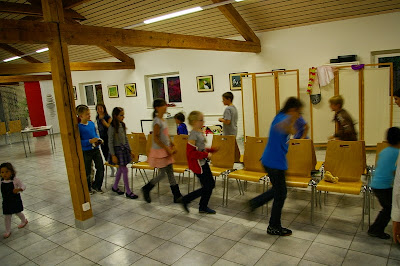
Dans le village où j'ai grandi, une famille chrétienne a fait des vagues une année en refusant de laisser leurs enfants assister à une fête d'Halloween pendant les heures d'école. C'était l'époque où la crainte du Satanisme était dans tous les médias.
L'année passée, on a été amené à déterminer notre propre 'politique' en la matière, qui s'est avéré un peu plus culturelle et esthétique que spirituelle. D'une part, c'est un truc importé de l'étranger: les commerces essaient depuis les années de faire percer Halloween - il leur manque un 'truc' entre 'La rentrée' et Noël. D'autre part, à choisir on préfère que nos filles se déguisent en pompier ou princesse plutôt que sorcière ou fantôme.

In the village where I grew up, one Christian family made waves by refusing to let their children participate in Halloween 'festivities' at school. It was a time when (fear of) Satanism was all the rage in some circles.
Last year we were hammering out our own 'principles' on the matter, which were slightly more cultural and aesthetic than spiritual: for one, it's a 'foreign' thing which stores have been pushing here for years (they need something between 'back to school' and 'Christmas'). For another, somewhat in the vein of 'whatsoever is lovely, whatsoever is admirable', we'd rather have our daughters dressing up as firemen or princesses than witches or ghouls.


Alors Kalia - qui ne manque jamais d'idées - a inventé la 'Fête des lumières' (bon, à la base c'était la fête des stars...). Mais sans suivi de notre part, rien ne s'est fait. Jusqu'à cette année où elle est revenue à la charge et j'ai décidé qu'il m'incomber de l'accompagner pour réaliser son projet. Alors on s'est assis, on a fait une liste, et avec cette liste on a fait d'autres listes: à inviter, à acheter, à préparer, à faire, à amener...

So ever-resourceful Kalia came up with the idea of a 'Festival of lights'. But with not much follow-up from us, nothing happened. Until this year, when she brought it up again, and I decided that the onus was on me to help her to make it happen. So we sat down, we made a list, then we used the list to make other lists: who to invite, what to buy, what to prepare, what we were going to do, who was going to do it...

On a pensé à dire aux enfants de venir déguisés, mais pour finir c'était plus amusant d'amener une malle avec des déguisements et laisser faire les enfants sur place.

We thought of fancy dress, but then decided it would be more fun (and less hassle) to just have a dressing-up-chest there, and let the kids dress up as much (or as little) as they wanted.

Il y avait 3 autres activités: ici décoration des cupcakes.

There were four different activities, here it's decorating cupcakes.

Ici je fais des maquillages. D'abord c'est les filles qui viennent, mais après les garçons se convainquent aussi.

Me doing 'face' painting. It's funny how it starts with the girls, but then the boys want something too.

Ce bricolage était un masque d'automne. Là pour de sur je me suis lancé dans un truc énorme. Plutôt que d'aller ramasser des feuilles dehors, j'ai imprimer plus de 300 fausses feuilles, que les filles ont peints, et ensuite j'ai passé une soirée entière à les découper!

This craft project was an 'autumn mask', and I sure bit off more than I could chew. Rather than going outside and gathering leaves, I printed out something like 300 fake leaves, which the girls then painted and I spent a whole evening cutting out!

Après la partie bricolage, place au spectacle. D'abord Guignol, que Kalia a improvisé avec une amie. J'avais un peu peur que cela soit 'nul', mais les enfants étaient tous morts de rire.

After the crafty part, there was a 'show': Kalia ad-libbed a Punch & Judy show with a friend. I admit to being rather scared that it would be cringeworthy, but the kids all laughed themselves silly.

Ensuite elle a joué quelques morceaux de piano, pendant que Rebecca et Matteo faisaient une 'danse indienne'.

She put her piano lessons to good use playing a couple of pieces while Rebecca et Matteo did an 'Indian dance'.

Ensuite elle a improvisé une danse 'Hip-hop', avec roues et grand écart.

Then she improvised a dance based on her new 'Hip-hop' lessons. Complete with cartwheels and splits!

Une fois qu'on avait fini toutes les activités, on s'est rabattu sur les classiques des fêtes d'enfants, en attendant que les parents arrivent pour l'apéritif. Après quoi on a tout rangé.
Beaucoup de travail, mais Mission Accomplie, et je suis très fier de ma fille.

Once all creative possibilities were exhausted, we fell back on the old party favourites, before the parents turned up for an aperitif, and then we tidied everything up.
Lots of work, but Mission Accomplished, and incredibly proud of my daughter.
 Divers trucs, dans le désordre. Voilà Kalia avec deux assiettes de crudités qu'elle m'a aidé à préparé pour notre fête de Noël de l'immeuble.
Divers trucs, dans le désordre. Voilà Kalia avec deux assiettes de crudités qu'elle m'a aidé à préparé pour notre fête de Noël de l'immeuble. Various bits and bobs, not even in the right order. Here's Kalia with two plate of salad & dips she helped me prepare for yesterday's neighbour's Christmas party.
Various bits and bobs, not even in the right order. Here's Kalia with two plate of salad & dips she helped me prepare for yesterday's neighbour's Christmas party. Rebecca a pleuré toutes les larmes de son corps quand elle a dû rendre le lapin de la Crèche Vivante.
Rebecca a pleuré toutes les larmes de son corps quand elle a dû rendre le lapin de la Crèche Vivante. Rebecca cuddling a rabbit at the church Nativity Scene. She shed loads of tears when having to give it back :(
Rebecca cuddling a rabbit at the church Nativity Scene. She shed loads of tears when having to give it back :( Kalia trouve facilement à s'occuper quand il y a des visites peu intéressantes.
Kalia trouve facilement à s'occuper quand il y a des visites peu intéressantes. Kalia is very good at finding things to do when we've got 'boring' visitors.
Kalia is very good at finding things to do when we've got 'boring' visitors. Une stage de karate.
Une stage de karate. Kalia on one of her karate courses.
Kalia on one of her karate courses. Préparation du sapin de Noël.
Préparation du sapin de Noël. Getting the Christmas tree ready.
Getting the Christmas tree ready. Kalia a voulu faire des bonhommes de pain d'épice. Alors on les a faits. Ensuite elle a fait une liste de tous les amis à qui elle voulait les offrir. On a fait les comptes, et réduit la liste de façon drastique. Le 24, on a fait une tournée 'Père Noël' pour distribuer les petits paquets, en essayant de ne pas se laisser voir!
Kalia a voulu faire des bonhommes de pain d'épice. Alors on les a faits. Ensuite elle a fait une liste de tous les amis à qui elle voulait les offrir. On a fait les comptes, et réduit la liste de façon drastique. Le 24, on a fait une tournée 'Père Noël' pour distribuer les petits paquets, en essayant de ne pas se laisser voir! Kalia wanted to make gingerbread men. So we did. And then she chose which friends she wanted to give them too. We did the sums and cut down the list by half (not enough to go round). On Christmas Eve we did a big 'Father Christmas' tour, delivering the goodies (while trying not to be seen!).
Kalia wanted to make gingerbread men. So we did. And then she chose which friends she wanted to give them too. We did the sums and cut down the list by half (not enough to go round). On Christmas Eve we did a big 'Father Christmas' tour, delivering the goodies (while trying not to be seen!). Une cabane. C'est bizarre, mais je me rappelle parfaitement la sensation de sécurité et d'excitation d'être dans une cabane.
Une cabane. C'est bizarre, mais je me rappelle parfaitement la sensation de sécurité et d'excitation d'être dans une cabane. A den. Strangely, I vividly remember the 'safe and tingly' feeling of being in a den.
A den. Strangely, I vividly remember the 'safe and tingly' feeling of being in a den.



















